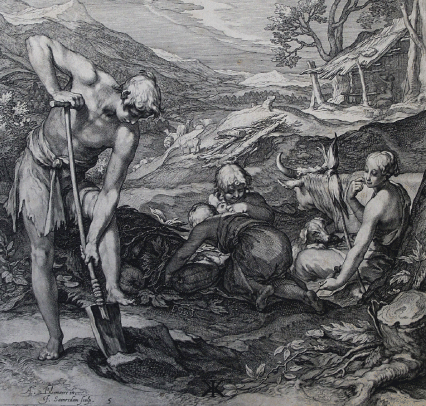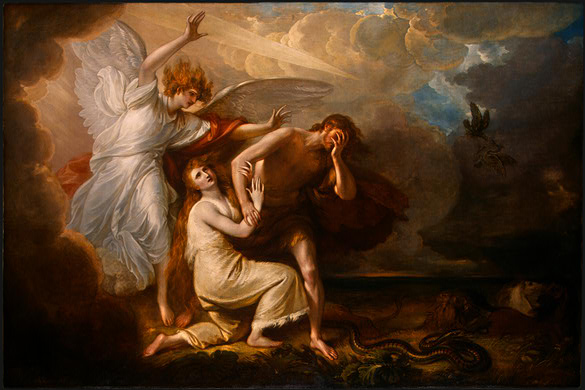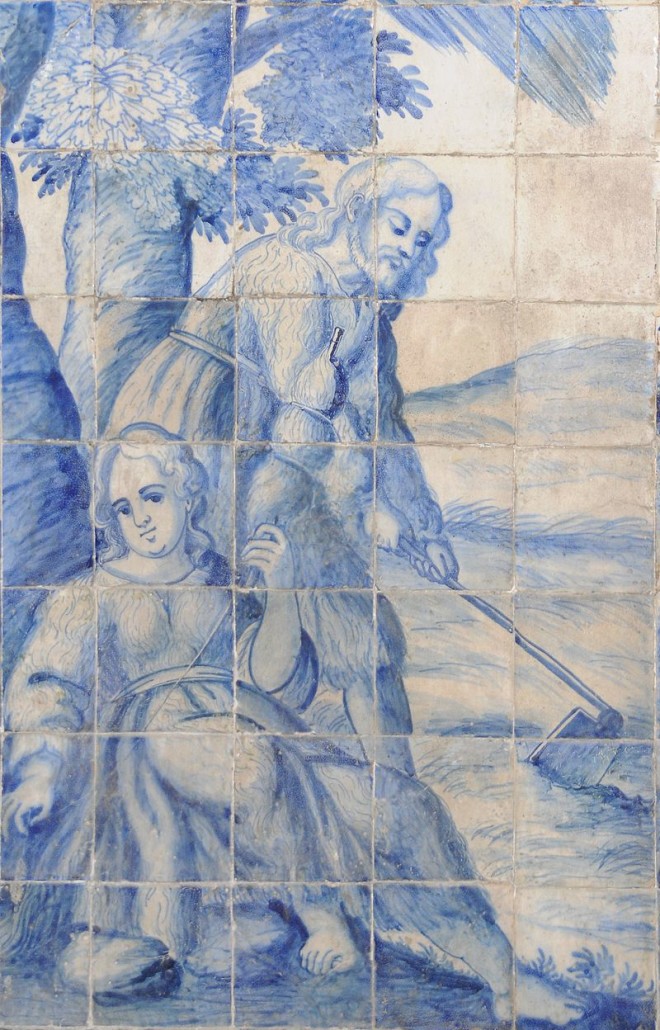The divine feminine provides balance in a zion society because there is also a divine masculine. The man is not without the woman in the Lord. Balance. One does not rule over the other. There is not a matriarchy or patriarchy.
We see this balance in the Garden of Eden, when the Gods declare, “it is not good that man should be alone.” Man is incomplete by himself — woman is incomplete by herself.
And it is the Adversary who tries to stir things up and drive a wedge between Adam and Eve. He wants to upset the balance. He approaches each of them alone in the garden to get one of them to decide without the other.
And he succeeds in separating them when he convinces Eve to partake of the fruit of the tree of knowledge. At that moment, at that bite, Eve becomes mortal– telestial. She and Adam are not even of the same glory now. Adam is still of a paradisiacal glory. Yet Eve convinces Adam to follow her into this new, lower realm of mortality (after all, it is a wise choice for our eternal progression.) She reminds him that God commanded them to stay together and that it is better this way — to know about opposition. And Adam chooses to go with her and become telestial. Together, Adam and Eve thwart Satan’s plan to break up the harmony and balance.
When God curses Adam and Eve, he curses them equally. They both must labor — sorrow — “astav, meaning to labor, to toil, to sweat, to do something very hard.” (Matriarchy and Patriarchy, Hugh Nibley)
Unto the woman, I, the Lord God, said: I will greatly multiply thy sorrow and thy conception. In sorrow thou shalt bring forth children, and thy desire shall be to thy husband, and he shall rule over thee.
And unto Adam, I, the Lord God, said: cursed shall be the ground for thy sake; in sorrow shalt thou eat of it all the days of thy life. (Moses 4: 22-23)
So while both Adam and Eve are cursed, at first glance, it seems unfair for the man to rule over the woman. Or for the woman to be put under oath to obey the law of her husband or to keep the law of the Lord and listen to the counsel of her husband as he listens to God’s counsel. Hugh Nibley explains it as a form of check and balances:
There is no patriarchy or matriarchy in the garden; the two supervise each other. Adam is given no arbitrary power; Eve is to heed him only insofar as he obeys their Father—and who decides that? She must keep check on him as much as he does on her. (Matriarchy and Patriarchy, p 93 Old Testament and Related Studies, Hugh Nibley)
Perhaps this makes more sense when you look at the role of proxy saviors and vassal king relationships. Eve covenants to obey Adam’s law in as much as he obeys God’s law. This is the ancient law of covenant relationships — the vassal/king relationship. When the vassal keeps the law of the King, the King is bound to protect the vassal. It is the proxy savior role — the savior Jesus Christ kept the law of God his father, Jesus saves us when we keep his law. In this light, Adam is the proxy savior for his wife Eve and household — Adam keeps God’s law which means all those of his household who keep his law (which is really God’s law) are encircled in the robes of the Father. It is not meant to be a point of contention. This is how the Savior saves us. (Avraham Gileadi)
When we fight about who should be first or who is in charge, we fight for patriarchy or matriarchy. Looking at the last part of those words — archy:
The suffix – archy means always to be first in order, whether in time or eminence; the point is that there can only be one first. To be first is Satan’s first principle: ‘Better to reign in Hell, than serve in Heav’n.”
In Bailly’s dictionary, the first definition given for the word –arche is ‘beginning, specifically the origin of a quarrel or a ‘murder’; the second definition is ‘command, power, authority,’ which is what the quarrel is about. (Nibley, Old Testament and Related Studies, p 95)
Best not to quarrel about who is first because they (Adam and Eve) are called Adam. “Male and female created he them, and blessed them, and called their name Adam” (Genesis 5:2). Perfectly balanced, they are one. The divine feminine and the divine masculine work together.
For further reading, see Matriarchy and Patriarchy, Old Testament and Related Studies, Hugh Nibley.
Originally published Jan. 2016, updated Mar 2021



